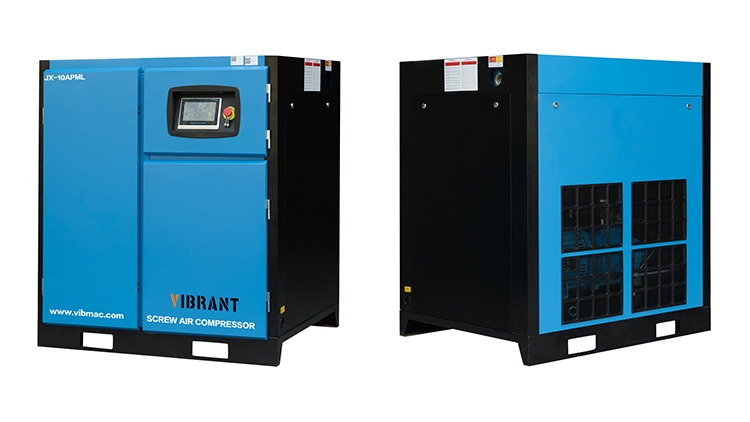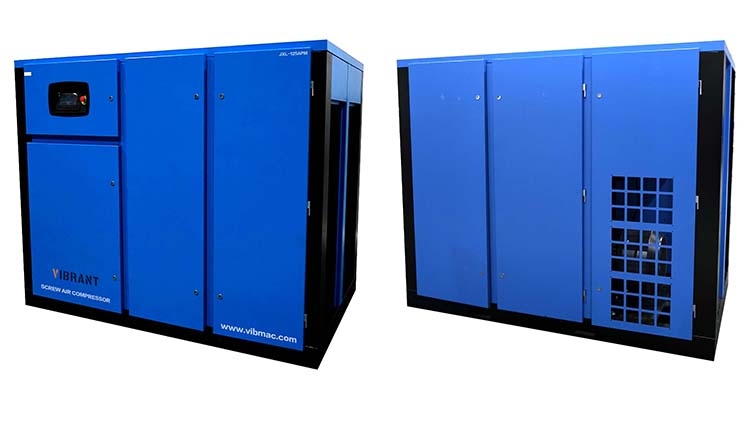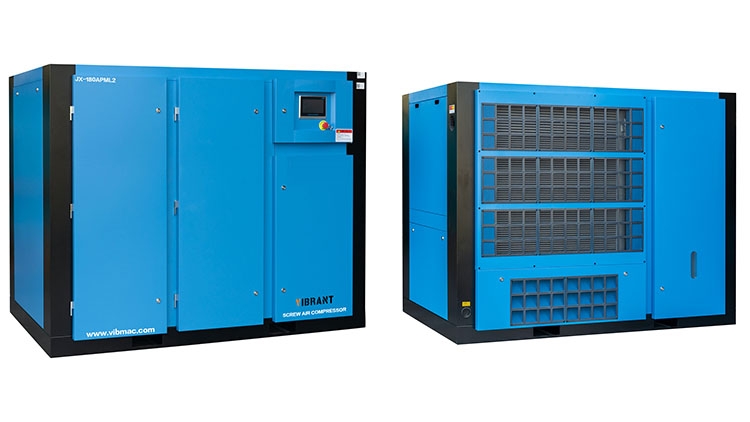
What Is a Laboratory Air Compressor?
The laboratory air compressors are a piece of equipment that supplies uncontaminated and dependable compressed air to laboratory tools and equipment. These devices are crucial for performing any scientific or medical tests, as well as any analytical work that needs to be done at the lab, as they keep all the laboratory machines operational.
Why are Laboratory Air Compressors Important?
Laboratory-grade compressed air systems are fundamental in furnishing power for laboratory tools like analytical equipment, autoclaves, pneumatic laboratory tools, etc. A lab air compressor plays a major role in assuring consistent stability in maintaining the desired air pressure, reporting the contaminant-free air, and feeding clean air to compressible instruments and tools while executing various works and processes.
What makes oil-free air compressors stand out as the most ideal for Laboratories?
Oil-free air compressors are specifically designed to function without the application of lubricating oil, which means that no oil particles will contaminate the compressed air. In a laboratory, even minute traces of oil can affect the accuracy of an experiment, medical test, or detailed scientific analysis, making it essential to maintain cleanliness.
1. Effective and Efficient Work Output
Due to the presence of advanced and high-efficiency motors installed, these compressors possess smooth and constant operation. This leads to an increase in operational effectiveness while decreasing energy use, making it sustainable economically. Reduced energy costs make laboratories more sustainable, amplifying the benefits of these oil-free air compressors.
2. Unobtrusive Function for Delicate Settings
An oil-free air compressor stands apart because of its exceptionally quiet operation. It is the best choice for places such as medical labs, research centers, and hospitals that require silence because oil-less compressors will not disturb your workflow.
Advantages of Laboratory Air Compressors for Use in Laboratories
1. Large Safety Margins
The construction of an oil-less air compressor considers safety. The simple, well-structured design with fewer moving parts minimizes the probability of mechanical malfunctions, and oil-free crankcase technology means that an oil-free compressor cannot contaminate the air supply with oil, which helps maintain a safe environment in the laboratory and for the users.
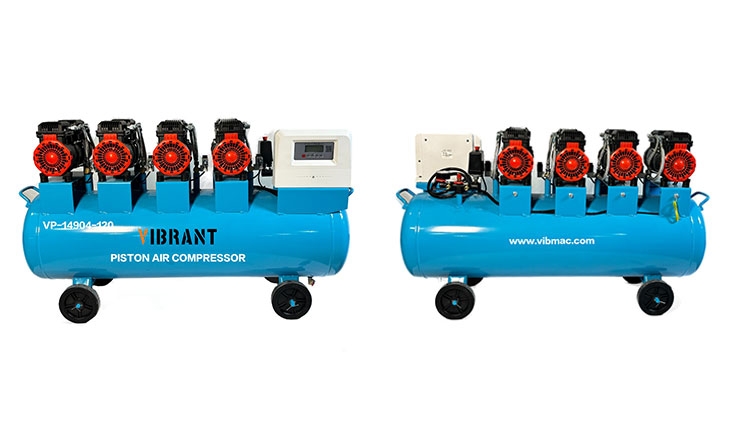
2. Long Life and Durability
The oil-free air compressor has an exemplary maintenance-free lifespan ranging from 8000 to 10000 hours, which is quite impressive, owing to its special features, structural design, and energy economy. These compressors do not need lubricants because the silt in the bearings is negligible and so is maintenance, which offers long uninterrupted service without costly repairs, changing oil, or frequent breakdown repairs.
3. Low Maintenance Requirements
Having an oil-free compressor can come with many different advantages, but the decreased maintenance needed is perhaps the one that stands out the most. Oiling it is one of the most time-consuming tasks, and with an oil-free air compressor, tank upkeep is significantly minimized. This is quite beneficial for laboratories looking to scale down on operational costs but maintain the same level of productivity. Maintenance is minimized due to the independent casting cylinders, which lessen the hassle of upkeep.
Ideal Applications for Laboratory Air Compressors
These compressors are irrelevant to market segmentation and can be used in all sectors. Some of the most common uses include:
•The pharmaceutical industry, where pure, clean air is needed for medical or scientific purposes.
•Food Processing: Supplying clean air during food operations to prevent cross-contamination.
•Electronics Manufacturing: Providing clean air for powering pneumatic tools and automated machinery to prevent contamination of sensitive equipment.
Features To Consider in A Laboratory Air Compressor
When searching for laboratory air compressors, it is important to look at their specific application features to determine if they meet the desired needs. Here are the features that are most likely to be of value:
1. High Purity Air
For sensitive equipment used in scientific investigations, the caliber of compressed air must be regarded. High purity air compressors protect against supply contamination by oil or moisture. These compressors have filters and dryers that minimize the air pollutants.
2. Constant Air Pressure
Maintaining precision and accuracy in capturing data with lab devices requires constant air pressure. To ensure proper regulation of air pressure, flow, and consistency, variable speed laboratory air compressors are recommended.
3. Compact Design
Laboratories have confined spaces, which makes the use of small laboratory air compressors or compact air compressors for laboratories very useful wherever they are used. Having a small footprint allows conserving precious space in the laboratory.
4. Low Noise Operation
In an analytical laboratory, a low level of noise is often desirable in the workspace, especially in the medical research areas, which require the use of a quiet air compressor. Low-noise lab compressors are designed to ensure that your experiments will not be interrupted by the noise of machinery.
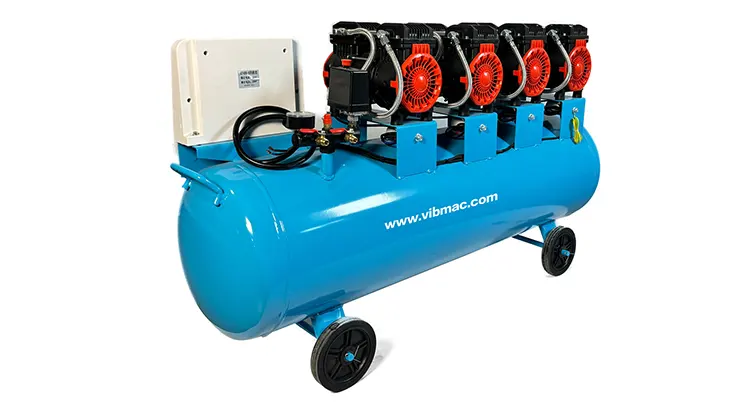
Choosing the Right Laboratory Air Compressor
You also need to consider many factors when selecting an air compressor for the laboratory. Here are a few suggestions to ensure you make the most appropriate decision:
1. Pay attention to the Application:
Different lab applications have different requirements. For example, some labs may only need a small air compressor for a single lab instrument, while more complex setups may need larger, industrial-sized air compressors.
2. Maintenance Requirements:
An oilless air compressor is more delicate but provides less maintenance work than oil units. This makes these devices preferable to those laboratories that seek reliability along with minimal downtime.
3. Noise Levels:
For some laboratories, quiet operation is an absolute necessity. In those cases, oil-free or low-noise air compressors are an ideal option. These are particularly helpful in medical and analytical laboratories.
4. Air Quality Needs:
Sensitive medical or scientific research labs are greatly concerned with the possibility of contamination. Such labs need non-polluted, high-purity air compressors.
Conclusion
A laboratory air compressor is important in ensuring that your laboratory equipment runs smoothly. From needing a sensitive scientific grade high-purity oil free compressor to a quiet air compressor for a medical lab, these solutions are available for every lab. To learn more about these air compressors and check out our products, go to the VIBRANT Laboratory Compressors.




